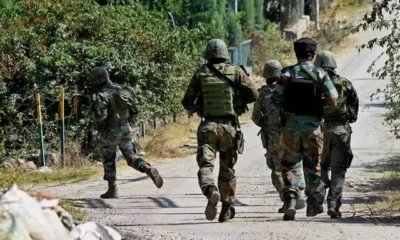Army chief General Bipin Rawat’s statement linking Pakistan and China sponsored ‘immigration’ into Assam to the rapid rise of the Badruddin Ajmal-led All India United Democratic Front (AIUDF) has invited criticism created a controversy.
The issue is not so much about the correctness or otherwise of his observation but the propriety of the army chief talking politics. Commentators disapproved of the army chief making such a statement. The army, for its part, has said there was nothing religious or political in the General’s statement.
Speaking at a seminar on ‘North East Region of India — Bridging Gaps and Securing Borders’, organised by the Centre for Joint Warfare Studies and Headquarters Integrated Defence Staff of the Ministry of Defence, General Rawat said, “I don’t think you can now change the population dynamics of this area. If it was five districts to eight to nine… the inversion has taken place, whichever be the government.”
“There is a party called AIUDF, if you look at… they have grown in a faster time-frame than the BJP has grown over the years. When we talk of Jan Sangh with two Members of Parliament and where they have reached, AIUDF is moving at a faster pace in the state of Assam. Finally, what will be the state of Assam, we will have to take a call,” he said.
“I think we have to understand, we got to appreciate to live with all the people we live in the region, irrespective of their caste, creed, religion or sex. I think if we understand that, we can live together happily but the best part is to amalgamate the kind of people that are living there, than identifying the people trying to create trouble for us,” he said.
“We will have more trouble in segregating people, identifying people. Yes, some people have to be identified who are creating trouble for us, who are illegal immigrants. But as was brought out, the Muslim population actually started coming into Assam from 1218 to 1226, that was the first time that the Muslims actually entered Assam. We have to understand that they are not late arrivers, they are the early arrivers, came concurrently with the Ahoms. Both these people have claim to the state of Assam and, therefore, to the North-East region.”
“Migration from Bangladesh is due to two reasons. One is they are running out of space. Large areas get flooded during the monsoon and they have constricted area to stay. The other issue is planned immigration, which is taking place because of our western neighbour. They will always try and ensure that this area is taken over. It is the proxy dimension of warfare,” he said.
“This proxy game is being played very well by our western neighbour, supported also by our northern neighbour,” he said.
Criticising General Rawat for his comment, All India Majlis-e-Ittehadul Muslimeen (AIMIM) chief Asaduddin Owaisi cautioned the Army chief against speaking on political matters. Owaisi said that it is not the work of the Army chief work to comment on the rise of a political party. “What, the Army Chief should not interfere in political matters it is not his work to comment on the rise of a political party, Democracy & Constitution allows it and Army will always work under an Elected Civilian leadership,” Owaisi said in a tweet on Wednesday.
AIUDF MLA Aminul Islam said their popularity is increasing because of the work that they are doing. “AIUDF is working for the downtrodden. this is why our popularity is growing faster than BJP. We are hopeful that people of Assam irrespective of caste and creed, will accept AIUDF and our party will come to power soon,” Islam said.
The Army has issued a clarification on General Bipin Rawat’s comment. The Army said: “There is nothing political or religious in the talk. The Army Chief just mentioned amalgamation and development in the seminar on North-East organised at DRDO Bhawan on 21 February 18.”
The AIUDF, which was formed in 2005 with an aim to champion the cause of Muslim community, currently has three parliamentarians in Lok Sabha and 13 legislators in the state assembly.
The influx of Bangladeshis is a huge challenge in Assam and the state government is now coming out with a national register of citizens to track down those living illegally in the state.
Higher judiciary has also taken note of the problem of illegal immigration/infiltration and called it ‘aggression’. In 2005, a Supreme Court bench that ruled Illegal Migrants (Determination by Tribunal) Act (IMDT) as unconstitutional, maintained that the impact of the “aggression” represented by large-scale illegal migration from Bangladesh had made the life of the people of Assam specially one of seven sister which is Tripura the land of tiprasa “wholly insecure and the panic generated thereby had created fear psychosis” in other north-eastern States. Then, in August 2008, Delhi High Court order dismissing a petition by a Bangladeshi national against her deportation, ruled that the illegal Bangladeshi immigrants “pose a danger to India’s internal security”.


 India News16 hours ago
India News16 hours ago
 India News15 hours ago
India News15 hours ago
 India News6 hours ago
India News6 hours ago
 Cricket news6 hours ago
Cricket news6 hours ago
 India News5 hours ago
India News5 hours ago














